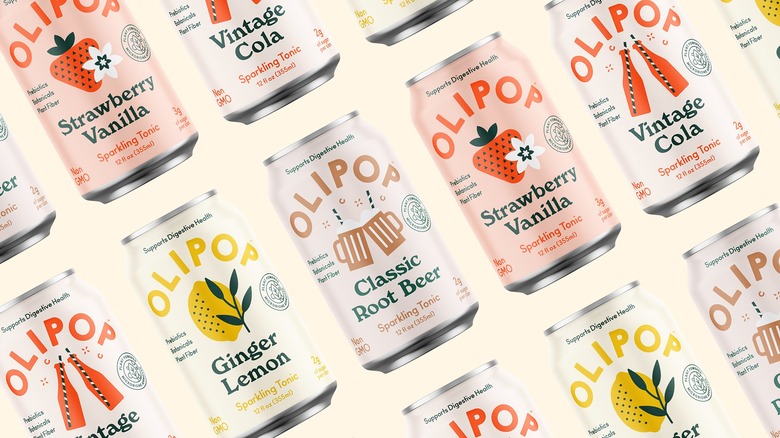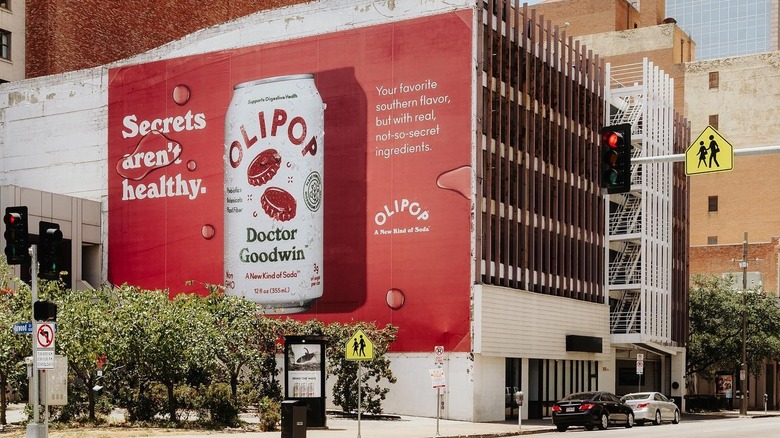The Scientific Meaning Behind OLIPOP's Name
It doesn't take a scientist to recognize that a canned drink bearing the letters POP is likely to be fizzy, flavorful, and often made from nutrition-deficient ingredients. After all, "pop" has been an established generic name for effervescent soda drinks since at least 1812, when English poet Robert Southey mentioned it in a letter, notes Today I Found Out. But today's OLIPOP introduces science and nutrition in a new way, and the secret lies in the first three letters rather than the final three.
Southey wrote that the word "pop" comes from the popping sound made when early soda bottles were "popped" open. The original bottles contained tops with stoppers, typically made from metal, according to The American Society of Mechanical Engineers. But he also referred to the contents of the bottle, stating, "'pop goes the cork' when it is drawn, and pop you would go off too, if you drank too much of it." Who knows what he actually meant by that — perhaps a humorous hint at gassy digestive issues.
As fate would have it, more than 200 years later, there's now a soda designed specifically to support digestive and microbiome health. And its name, OLIPOP, comes with a whole lot of scientific details, revealed by its maker.
Pop goes the oligosaccharides
Now for the science behind that playful name — and it has nothing to do with a rhyming treat, the sweet lickable lollipop. On the contrary, a can of OLIPOP soda not only bypasses harmful ingredients, but it may actually be good for you, according to Health Digest. That comes down to the OLI in its name, which is short for oligosaccharides.
OLIPOP shares how the two founders, Ben and David, were brainstorming a name for the revolutionary new prebiotic soda they invented. A "Yin" and "Yang" name turned into the brand identity they'd been seeking, with the name referring to the serious health benefits of oligosaccharides for digestive health, and the "fun and delicious" tonic characteristics that people love and crave.
The company describes OLIPOP as a gut-healthy soda created with probiotics, fiber, and edible botanicals – which is where the oligosaccharides come in. Healthline describes oligosaccharides as a type of carbohydrate existing naturally in many edible plants, which can serve the function of a prebiotic, meaning food for your gut bacteria. Since the human digestive tract typically fails to digest the sugars in oligosaccharides, they continue on through the gut to the colon, where they enhance the growth of valuable bacteria.
How the cans stack up
Every can of OLIPOP contains five botanicals and a company blend known as OLISMART, which harbors three of the prebiotic oligosaccharides that are considered biome supporters: Jerusalem artichoke inulin, chicory root inulin, and cassava root fiber, per the company.
It obviously contains healthy components absent in other soda drinks. But Health Digest gives a nod to what OLIPOP doesn't contain, namely artificial flavors and high-fructose corn syrup. There's a near absence of sugar — as low as 2 to 3 grams per serving compared to up to 39 grams of added sugar in a 12-ounce can of Coke.
While diet sodas reduce or eliminate sugar, they use artificial sweeteners that might wreak havoc on your metabolism, elevate risks for diabetes and heart disease, and eventually lead to weight gain instead of loss, per WebMD, which emphatically states: "Don't pop that top."
Shape gives a nod to probiotic sodas, pointing out the health benefits, but also cautioning that too much of a good thing can have unwanted effects. The body benefits from at least three to 10 grams of prebiotics per day, and a can of OLIPOP has nine grams — but consuming 40 or more grams can cause bloating or gas.
OLIPOP comes in 12 different flavors to date, including a classic root beer, ginger lemon, vintage cola, and classic grape. They're available in major grocery outlets across the country, and a store locater helps pinpoint local stores.


